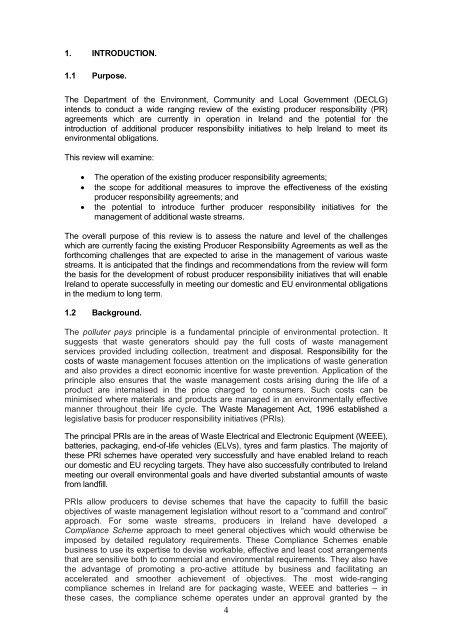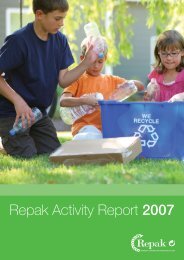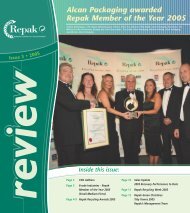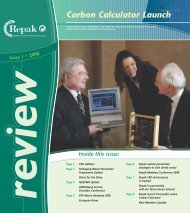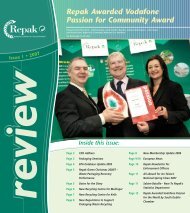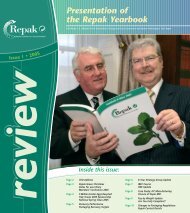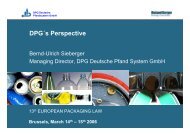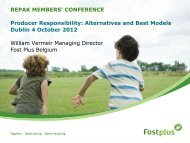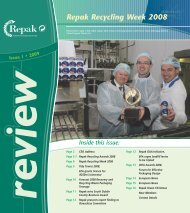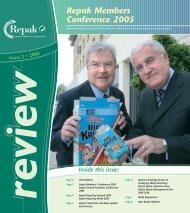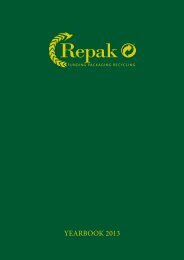Review Of The Producer Responsibility Initiative Model In ... - Repak
Review Of The Producer Responsibility Initiative Model In ... - Repak
Review Of The Producer Responsibility Initiative Model In ... - Repak
You also want an ePaper? Increase the reach of your titles
YUMPU automatically turns print PDFs into web optimized ePapers that Google loves.
1. INTRODUCTION.<br />
1.1 Purpose.<br />
<strong>The</strong> Department of the Environment, Community and Local Government (DECLG)<br />
intends to conduct a wide ranging review of the existing producer responsibility (PR)<br />
agreements which are currently in operation in Ireland and the potential for the<br />
introduction of additional producer responsibility initiatives to help Ireland to meet its<br />
environmental obligations.<br />
This review will examine:<br />
<br />
<br />
<br />
<strong>The</strong> operation of the existing producer responsibility agreements;<br />
the scope for additional measures to improve the effectiveness of the existing<br />
producer responsibility agreements; and<br />
the potential to introduce further producer responsibility initiatives for the<br />
management of additional waste streams.<br />
<strong>The</strong> overall purpose of this review is to assess the nature and level of the challenges<br />
which are currently facing the existing <strong>Producer</strong> <strong>Responsibility</strong> Agreements as well as the<br />
forthcoming challenges that are expected to arise in the management of various waste<br />
streams. It is anticipated that the findings and recommendations from the review will form<br />
the basis for the development of robust producer responsibility initiatives that will enable<br />
Ireland to operate successfully in meeting our domestic and EU environmental obligations<br />
in the medium to long term.<br />
1.2 Background.<br />
<strong>The</strong> polluter pays principle is a fundamental principle of environmental protection. It<br />
suggests that waste generators should pay the full costs of waste management<br />
services provided including collection, treatment and disposal. <strong>Responsibility</strong> for the<br />
costs of waste management focuses attention on the implications of waste generation<br />
and also provides a direct economic incentive for waste prevention. Application of the<br />
principle also ensures that the waste management costs arising during the life of a<br />
product are internalised in the price charged to consumers. Such costs can be<br />
minimised where materials and products are managed in an environmentally effective<br />
manner throughout their life cycle. <strong>The</strong> Waste Management Act, 1996 established a<br />
legislative basis for producer responsibility initiatives (PRIs).<br />
<strong>The</strong> principal PRIs are in the areas of Waste Electrical and Electronic Equipment (WEEE),<br />
batteries, packaging, end-of-life vehicles (ELVs), tyres and farm plastics. <strong>The</strong> majority of<br />
these PRI schemes have operated very successfully and have enabled Ireland to reach<br />
our domestic and EU recycling targets. <strong>The</strong>y have also successfully contributed to Ireland<br />
meeting our overall environmental goals and have diverted substantial amounts of waste<br />
from landfill.<br />
PRIs allow producers to devise schemes that have the capacity to fulfill the basic<br />
objectives of waste management legislation without resort to a ”command and control”<br />
approach. For some waste streams, producers in Ireland have developed a<br />
Compliance Scheme approach to meet general objectives which would otherwise be<br />
imposed by detailed regulatory requirements. <strong>The</strong>se Compliance Schemes enable<br />
business to use its expertise to devise workable, effective and least cost arrangements<br />
that are sensitive both to commercial and environmental requirements. <strong>The</strong>y also have<br />
the advantage of promoting a pro-active attitude by business and facilitating an<br />
accelerated and smoother achievement of objectives. <strong>The</strong> most wide-ranging<br />
compliance schemes in Ireland are for packaging waste, WEEE and batteries – in<br />
these cases, the compliance scheme operates under an approval granted by the<br />
4


